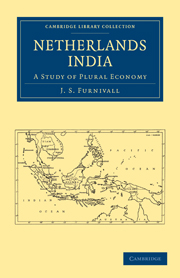Book contents
- Frontmatter
- INTRODUCTION
- Contents
- TERRITORIAL DIVISIONS
- NETHERLANDS INDIA
- AUTHOR'S PREFACE
- LIST OF GENERAL REFERENCES
- GLOSSARY
- MEASURES AND CURRENCY
- THE MALAY ARCHIPELAGO, IN COMPARISON WITH EUROPE
- Chapter I INDONESIA, TO 1600
- Chapter II THE EAST INDIA COMPANY, 1600–1800
- Chapter III THE YEARS OF CONFUSION, 1795–1815
- Chapter IV THE YEARS OF UNCERTAINTY, 1815–1830
- Chapter V THE CULTURE SYSTEM, 1830–1850
- Chapter VI THE TRANSITION TO LIBERALISM, 1850–1870
- Chapter VII LIBERALISM, 1870–190
- Chapter VIII EFFICIENCY, WELFARE AND AUTONOMY
- Chapter IX ADMINISTRATIVE AND POLITICAL REFORMS
- Chapter X ECONOMIC PROGRESS
- Chapter XI SOCIAL ECONOMY
- Chapter XII SOME EFFECTS OF THE CRISIS OF 1929
- Chapter XIII PLURAL ECONOMY
- INDEX OF REFERENCES
- GENERAL INDEX
Chapter VII - LIBERALISM, 1870–190
Published online by Cambridge University Press: 07 September 2010
- Frontmatter
- INTRODUCTION
- Contents
- TERRITORIAL DIVISIONS
- NETHERLANDS INDIA
- AUTHOR'S PREFACE
- LIST OF GENERAL REFERENCES
- GLOSSARY
- MEASURES AND CURRENCY
- THE MALAY ARCHIPELAGO, IN COMPARISON WITH EUROPE
- Chapter I INDONESIA, TO 1600
- Chapter II THE EAST INDIA COMPANY, 1600–1800
- Chapter III THE YEARS OF CONFUSION, 1795–1815
- Chapter IV THE YEARS OF UNCERTAINTY, 1815–1830
- Chapter V THE CULTURE SYSTEM, 1830–1850
- Chapter VI THE TRANSITION TO LIBERALISM, 1850–1870
- Chapter VII LIBERALISM, 1870–190
- Chapter VIII EFFICIENCY, WELFARE AND AUTONOMY
- Chapter IX ADMINISTRATIVE AND POLITICAL REFORMS
- Chapter X ECONOMIC PROGRESS
- Chapter XI SOCIAL ECONOMY
- Chapter XII SOME EFFECTS OF THE CRISIS OF 1929
- Chapter XIII PLURAL ECONOMY
- INDEX OF REFERENCES
- GENERAL INDEX
Summary
1. The Economic Environment. The year 1870 stands out in red letters in the chronicles of Netherlands India by reason of the Agrarian Law and Sugar Law, but it stands out even more conspicuously in world history by the revolution in economic relations, and therefore in social and political relations, between East and West which followed on the opening of the Suez Canal. The 'sixties were notable for improvements in communications : telegraphy, opened to the public in 1856; a modern postal service, inaugurated in 1862; the first few miles of railway in 1867; and on the high seas steamers were beginning to threaten the supremacy of the new clipper sailing ships. But the completion of the Suez Canal in 1869 changed the whole economic environment of Netherlands India, and the great achievement of Liberalism was that it enabled the Netherlands to profit by the change.
2. Economic Policy. From 1815 to 1870 the Dutch were struggling against adverse circumstances to develop the potential wealth of Java to the profit of the Netherlands. Muntinghe, Du Bus and Van den Bosch all agreed in regarding the colony as a staatsbedrijf, a State enterprise; it was the old tradition of Dutch government, both in Europe and in the East. They agreed also that a policy of laisser-faire would lead to an expansion of the area under rice and a growth in imports, but in imports of British goods, with a growing preponderance of British influence; and they held that some plan therefore was necessary for the protection of Dutch interests.
- Type
- Chapter
- Information
- Netherlands IndiaA Study of Plural Economy, pp. 174 - 224Publisher: Cambridge University PressPrint publication year: 2010First published in: 1939



